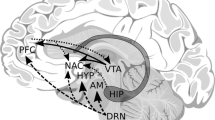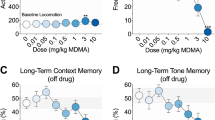Abstract
Rationale
Drug reward plays a central role in acquiring drug-seeking behavior. However, subjects may continue using drugs despite negative consequences because self-administration becomes habitual, and divorced from outcome values. Although a history of drug and alcohol use expedite habit acquisition, and in spite of the fact that self-administration leads to intoxication, the acute effects of drugs on habitual responding are not well understood.
Objectives
We sought to observe how acute ethanol and amphetamine affect the balance between habitual and goal-directed behavior, as measured by a fluid-reinforced operant conditioning task.
Methods
Selectively bred crossed high-alcohol-preferring (cHAP) mice were trained on an operant conditioning task reinforced on a variable interval schedule with 1% banana solution, which was subsequently devalued via LiCl pairing in half the animals. Ethanol (1.0 g/kg), amphetamine (2.0 mg/kg), or saline was administered prior to a post-devaluation test.
Results
Overall, mice showed habitual behavior, but when divided into high- or low-responding groups based on training response rates, saline-treated, low-responding animals devalued, while saline-treated high-responding animals did not. Furthermore, amphetamine elicited devaluation even in high-responding animals, while ethanol prevented devaluation even in low-responding animals.
Conclusions
These data show that ethanol shifts animals toward behaving habitually. This may illuminate why alcohol-intoxicated individuals display impaired judgment about the relative merits of drinking, and potentially serve as a mechanism by which intoxicated subjects resume previously devalued behaviors, such as comorbid drug use. These findings also show that high variable interval response rates facilitate a shift from goal-directed to habitual behavior.







Similar content being viewed by others
References
Archer T, Sjoden PO (1982) Higher-order conditioning and sensory preconditioning of a taste aversion with an exteroceptive CSi. Quarterly J Experimental Psychology B, Comparative Physiological Psychology 34(Pt 1):1–17
Balleine BW, O'Doherty JP (2010) Human and rodent homologies in action control: corticostriatal determinants of goal-directed and habitual action. Neuropsychopharmacology 35:48–69. https://doi.org/10.1038/npp.2009.131
Di Chiara G, Imperato A (1988) Drugs abused by humans preferentially increase synaptic dopamine concentrations in the mesolimbic system of freely moving rats. Proc Natl Acad Sci U S A 85:5274–5278
Corbit LH, Muir JL, Balleine BW (2001) The role of the nucleus accumbens in instrumental conditioning: evidence of a functional dissociation between accumbens core and shell. J Neurosci 21:3251–3260
Corbit LH, Nie H, Janak PH (2012) Habitual alcohol seeking: time course and the contribution of subregions of the dorsal striatum. Biol Psychiatry 72:389–395. https://doi.org/10.1016/j.biopsych.2012.02.024
Dickinson A (1985) Actions and habits: the development of behavioural autonomy. Philosophical Transactions Royal Soc London B: Biological Sci 308:67–78
Everitt BJ, Robbins TW (2016) Drug addiction: updating actions to habits to compulsions ten years on. Annu Rev Psychol 67:23–50. https://doi.org/10.1146/annurev-psych-122414-033457
Grahame NJ, Chester JA, Rodd-Henricks K, Li T-K, Lumeng L, Grahame NJ (2001) Alcohol place preference conditioning in high- and low-alcohol preferring selected lines of mice. Pharmacol Biochem Behav 68:805–814. https://doi.org/10.1016/S0091-3057(01)00476-2
Gremel CM, Costa RM (2013) Orbitofrontal and striatal circuits dynamically encode the shift between goal-directed and habitual actions. Nat Commun 4:2264. https://doi.org/10.1038/ncomms3264
Hogarth L, Attwood AS, Bate HA, Munafò MR (2012) Acute alcohol impairs human goal-directed action. Biol Psychol 90:154–160. https://doi.org/10.1016/j.biopsycho.2012.02.016
Imperato A, Di Chiara G (1986) Preferential stimulation of dopamine release in the nucleus accumbens of freely moving rats by ethanol. J Pharmacol Exp Ther 239:219–228
Jerlhag E, Egecioglu E, Dickson S, Engel J (2010) Ghrelin receptor antagonism attenuates cocaine- and amphetamine-induced locomotor stimulation, accumbal dopamine release, and conditioned place preference. Psychopharmacology 211:415–422. https://doi.org/10.1007/s00213-010-1907-7
Keller M (1972) On the loss-of-control phenomenon in alcoholism. British J Addiction Alcohol Other Drugs 67:153–166
Lesscher HM, van Kerkhof LW, Vanderschuren LJ (2010) Inflexible and indifferent alcohol drinking in male mice. Alcohol Clin Exp Res 34:1219–1225. https://doi.org/10.1111/j.1530-0277.2010.01199.x
Mangieri RA, Cofresi RU, Gonzales RA (2012) Ethanol seeking by Long Evans rats is not always a goal-directed behavior. PLoS One 7:e42886. https://doi.org/10.1371/journal.pone.0042886
McCloskey MS, Berman ME, Echevarria DJ, Coccaro EF (2009) Effects of acute alcohol intoxication and paroxetine on aggression in men. Alcohol Clin Exp Res 33:581–590. https://doi.org/10.1111/j.1530-0277.2008.00872.x
McKim W (1980) The effect of caffeine, theophylline and amphetamine on operant responding of the mouse. Psychopharmacology 68:135–138. https://doi.org/10.1007/BF00432130
Miller MA, Fillmore MT (2014) Protracted impairment of impulse control under an acute dose of alcohol: a time-course analysis. Addict Behav 39:1589–1596. https://doi.org/10.1016/j.addbeh.2013.10.035
Nelson A, Killcross S (2006) Amphetamine exposure enhances habit formation. J Neurosci 26:3805–3812. https://doi.org/10.1523/jneurosci.4305-05.2006
Nelson AJ, Killcross S (2013) Accelerated habit formation following amphetamine exposure is reversed by D1, but enhanced by D2, receptor antagonists. Front Neurosci 7:76. https://doi.org/10.3389/fnins.2013.00076
Panlilio LV et al (2004) Human cocaine-seeking behavior and its control by drug-associated stimuli in the laboratory. Neuropsychopharmacology 30:433–443
Patton MH, Roberts BM, Lovinger DM, Mathur BN (2016) Ethanol disinhibits dorsolateral striatal medium spiny neurons through activation of a presynaptic delta opioid receptor. Neuropsychopharmacology 41:1831–1840. https://doi.org/10.1038/npp.2015.353
Pudiak CM, KuoLee R, Bozarth MA (2014) Tolerance to cocaine in brain stimulation reward following continuous cocaine infusions. Pharmacol Biochem Behav 122:246–252. https://doi.org/10.1016/j.pbb.2014.04.006
Robbins TW, Everitt BJ (2002) Limbic-striatal memory systems and drug addiction. Neurobiol Learn Mem 78:625–636
Sjoerds Z, de Wit S, van den Brink W, Robbins TW, Beekman AT, Penninx BW, Veltman DJ (2013) Behavioral and neuroimaging evidence for overreliance on habit learning in alcohol-dependent patients. Transl Psychiatry 3:e337. https://doi.org/10.1038/tp.2013.107
Vanderschuren LJ, Everitt BJ (2004) Drug seeking becomes compulsive after prolonged cocaine self-administration. Science (New York, NY) 305:1017–1019. https://doi.org/10.1126/science.1098975
Vanhanen J, Kinnunen M, Nuutinen S, Panula P (2015) Histamine H3 receptor antagonist JNJ-39220675 modulates locomotor responses but not place conditioning by dopaminergic drugs. Psychopharmacology 232:1143–1153. https://doi.org/10.1007/s00213-014-3751-7
Yin HH, Knowlton BJ, Balleine BW (2004) Lesions of dorsolateral striatum preserve outcome expectancy but disrupt habit formation in instrumental learning. Eur J Neurosci 19:181–189. https://doi.org/10.1111/j.1460-9568.2004.03095.x
Yin HH, Ostlund SB, Knowlton BJ, Balleine BW (2005) The role of the dorsomedial striatum in instrumental conditioning. Eur J Neurosci 22:513–523. https://doi.org/10.1111/j.1460-9568.2005.04218.x
Funding
AA07611 to David Crabb; AA07462 to Cristine Czachowski
Author information
Authors and Affiliations
Corresponding author
Ethics declarations
Conflict of interest
The authors declare that they have no conflict of interest.
Rights and permissions
About this article
Cite this article
Houck, C.A., Grahame, N.J. Acute drug effects on habitual and non-habitual responding in crossed high alcohol preferring mice. Psychopharmacology 235, 2167–2175 (2018). https://doi.org/10.1007/s00213-018-4914-8
Received:
Accepted:
Published:
Issue Date:
DOI: https://doi.org/10.1007/s00213-018-4914-8




